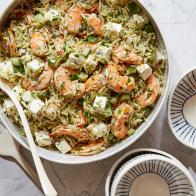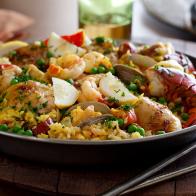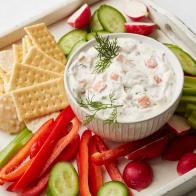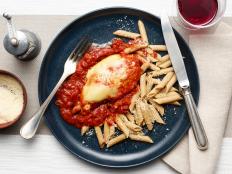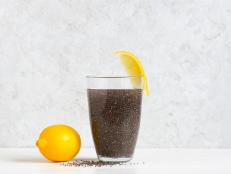How to Heal Your Gut, According to a Dietitian
Everybody’s G.I. tract is different, but eating certain foods can help alleviate symptoms — like bloating and some skin issues — connected to the gut.

4kodiak/Getty Images
When it comes to ways to alleviate symptoms like gas, bloating, digestive disorders and some skin issues, there can be a lot of variability. But poor gut health is likely connected to each of these conditions. And while the prospect of ‘nourishing your gut microbiome’ might seem a little out-there, and maybe even a bit overwhelming, the good news is that restoring gut health can help improve current symptoms and decrease inflammation throughout the body.
Gut health is extremely individual. Each person’s gastrointestinal (G.I.) tract is a very unique “forest” of different bacteria based on your own genetics and personal experiences.
“Food can be so powerful when it comes to gut health, but remember everyone is different,” says Erin Kenney, gut health dietitian and podcaster at NutritionRewired.com.
While we are all unique, there are a few tried-and-true ways to eat that can help most people. And even small changes can help your gut get back on track and heal.
Here are five dietitian-approved ways to help your gut:

Anastasia Dobrusina/Getty Images
Fill Up On Fiber
Most of us don’t get enough fiber. Eating more fiber can improve the health and variety of different types of good bacteria in our gut. Higher-fiber foods like fruits, vegetables, legumes and whole grains also contain prebiotics, which are a type of fiber which helps nourish gut bacteria. Constipation can get better from eating higher fiber foods.
Eat this: Foods that are especially rich in prebiotic fiber include onions, garlic, leeks, asparagus, bananas, apples, pears, barley, oats and whole wheat foods. Kenney does have a note of caution, “Individuals with gut irritation and inflammation should prioritize a gentler approach to dietary changes. In such cases, opting for lower-fiber, nutrient-rich foods is advisable to support the healing process.”
Find Collagen-Containing Foods
Collagen may be especially helpful in repairing a damaged intestinal lining. Our bodies begin to lose collagen in our mid-20s, so getting collagen-rich foods can help the body make more of its own. Collagen supplements are available, but since getting enough protein is essential for repairing the gut, getting collagen first from protein-rich food makes sense.
Eat this: Bone broth (homemade is budget-friendly), skin-on chicken, skin-on salmon (yes, eat the skin), canned sardines including skin and bones which contain the collagen. Eat collagen with a source of vitamin C which helps the body build collagen; think salmon with sliced oranges or chicken with salsa.

Zahra Siadat
Get the Recipe: Rose and Cardamom Chia Pudding
Look for Omega-3 Fatty Acids
Most people don’t eat enough omega-3 fats. Healthy fats help prevent constipation. Plus food sources of omega-3s (instead of supplements) have so many added benefits. “Omega-3s in wild salmon help promote gut bacteria diversity, walnuts help protect against colon cancer and chia seeds and flaxseeds are high in fiber,” says Kenney. “Additionally, omega-3 fats are necessary for preventing and reducing inflammation throughout the body, including in the gut.”
Eat this: Chia seed pudding for dessert! Add flaxseed to wholegrain pancakes or any grain bowl. Snack on tuna pouches.
Enjoy Fermented Foods
You’ve probably heard fermented foods are good for the gut. But why? It’s all about increasing the total number and different varieties of good bacteria in the gut. Different fermented foods contain unique bacteria strains. Fermented foods are also packed with other gut-nurturing nutrients like vitamin A (sauerkraut), magnesium and potassium (kefir) and B vitamins (miso). Lastly, the live cultures in kefir, yogurt and some fermented vegetables produce lactic acid which can inhibit bad bacteria overgrowth in the gut.
Eat this: Try sauerkraut on a sandwich. Or kimchi as a side. Or sip on simple-to-make miso soup. Enjoy yogurt in savory ways like swirled into scrambled eggs. Sip kombucha for an afternoon pick-me-up.
Add Naturally Anti-Microbial Foods
For severe gut health issues, Kenney strongly recommends medical testing. “Once it’s been determined by a practitioner that opportunistic bacteria overgrowth is present, a treatment plan including naturally anti-microbial foods can offer natural support,” she explains. These foods include several herbs and spices like thyme, oregano, parsley, sage, coriander, rosemary, lemongrass, garlic, cinnamon, clove, turmeric, along with MCT oil, manuka honey (also anti-viral) and coconut oil (anti-yeast).
Eat this: Swirl manuka honey over yogurt. Drizzle popcorn with melted coconut oil. Sprinkle cinnamon and parsley over whole grain bowls.
Once again, remember everyone has a unique gut.
“There are certain foods that can claim to be gut healthy. But it really depends on your own gut,” explains Kenney. “For example, bone broth is good for most people with an inflamed gut, but if you have a histamine intolerance that’s manifesting in a skin rash, then bone broth will exacerbate that issue.”
*This article was written and/or reviewed by an independent registered dietitian nutritionist.
Serena Ball, MS, RD is a registered dietitian nutritionist, culinary instructor, and mom of five children. She blogs at TeaspoonOfSpice.com and is the author of the best-selling The 30-Minute Mediterranean Diet Cookbook, Easy Everyday Mediterranean Diet Cookbook and the newly-released The Sustainable Mediterranean Diet Cookbook. Follow her @TspCurry on Instagram.
Related Content:
